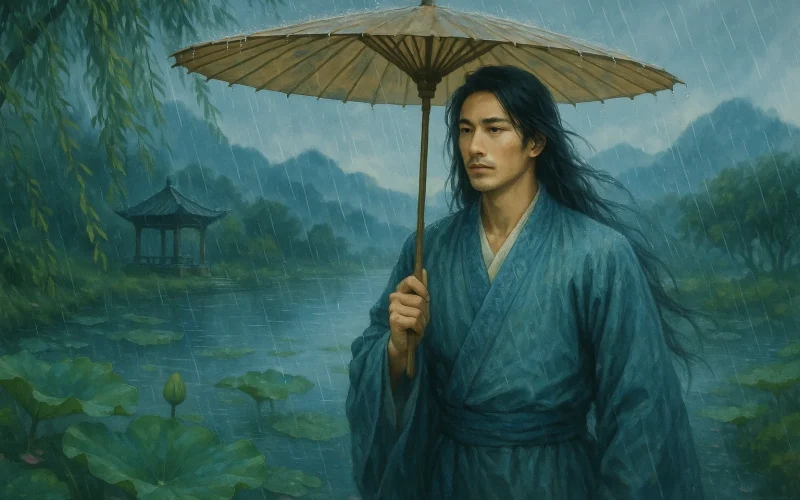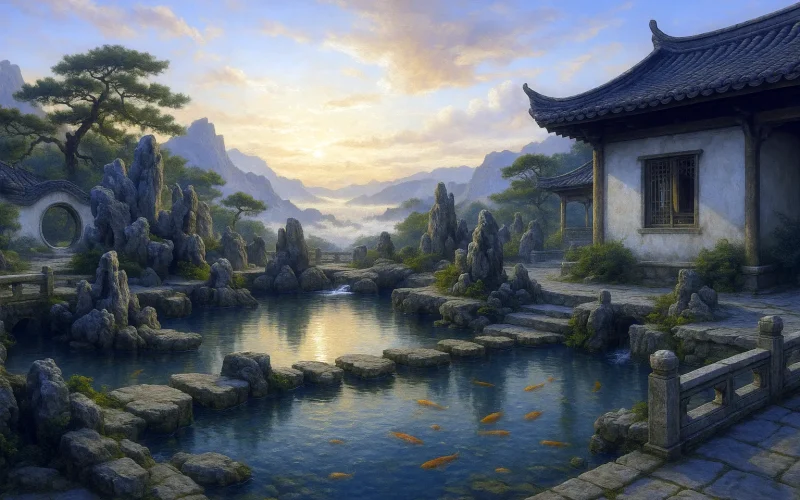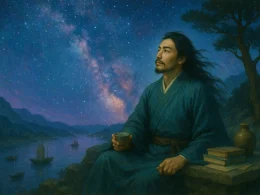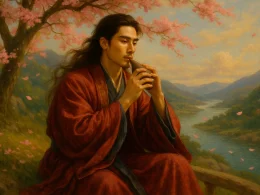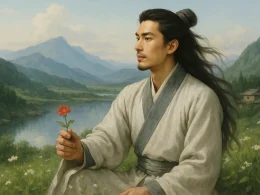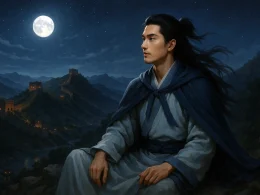Lü Benzhong (吕本中 1084 - 1145), a native of Shouxian in Anhui, was a renowned poet and Neo-Confucian scholar of the Southern Song Dynasty. As a key theorist of the Jiangxi Poetry School, he proposed the concept of "living method" (huofa), advocating for natural variation within established poetic rules. With over 1,270 surviving poems, his Genealogy of the Jiangxi Poetry School (Jiangxi Shishe Zongpai Tu) established Huang Tingjian as the school's patriarch, profoundly influencing Song poetic theory and serving as a bridge between the Jiangxi School and the Four Masters of the Mid-Song Revival.
Major Works
Life
Born in 1084 into the illustrious Donglai Lü family—whose members had served as chancellors for three generations since his great-grandfather Lü Gongzhu—Lü Benzhong displayed exceptional literary talent from a young age. He earned the jinshi degree in 1116 and began his career as a minor official in Jiyin. During this period, he immersed himself in poetry, associating closely with Jiangxi School poets like Xu Fu and Han Ju, and was deeply influenced by Huang Tingjian's theory of "transmuting iron into gold" through literary craft.
The Jingkang Incident (1127) dramatically altered the trajectory of this aristocrat's life. As Jin troops sacked Bianjing (Kaifeng), Lü witnessed firsthand the horrors of war, later recording the devastation in poems like Miscellaneous Poems After the Rebellion: "All things overturned in chaos, / Orchids and weeds indistinguishable." These works, transcending the Jiangxi School's bookish tendencies, revealed his deepening engagement with social realities.
Appointed as a diarist (Qiju Sheren) in 1136, Lü was demoted for opposing Qin Hui's appeasement policies. This political setback catalyzed his literary maturation: during his retirement in Shangrao, he formulated his seminal "living method" theory. He died in Xinzhou in 1145, penning in his final days the defiant line "In old age, I still cherish my writing brush, / Urging myself to tread diligently this life," epitomizing his scholarly tenacity.
Literary Achievements
Poetic Evolution
Lü's poetry progressed through three distinct phases. Early works like Summer Rain at Kaiyuan Temple in Liuzhou—"After rain, mountain hues turn pure; / Through pines, the breeze sings clear"—bore Huang Tingjian's hallmark rhetorical craftsmanship, sometimes to the point of stiffness. The mid-Jingkang period brought a transformative shift, as seen in Four Poems from Early Second Month, 1127 with its harrowing battle imagery: "White bones like sand, sand like snow."
His late style achieved transcendent simplicity. Spring Day Occasion exemplifies this:
"Convalescing, I note the lingering daylight, / Venturing weakly to inspect courtyard blossoms."
These seemingly plain lines, containing depths like "Snow melting in garden ponds—early spring's aftermath," perfectly embodied his "living method." Fang Hui praised such poems in The Sea of Lyric Poetry (Yingkui Luisui) for their "natural grace, unforced yet profoundly evocative."
Lyrics and Poetics
In ci poetry, Lü synthesized the subtlety of Ouyang Xiu and Qin Guan into a distinctive voice. Gathering Mulberries: Resenting You for Not Being the Moon Over the River Tower innovatively deployed lunar imagery:
"North, south, east, west— / Only following, never parting."
Song of the Southern Song: Post Road Invaded by the Slanting Moon captured solitude through vignettes like "A short fence, one yellow chrysanthemum remnant," earning Kuang Zhouyi's praise for "transparency grounded in substance."
As a theorist, Lü's contributions were monumental. His Genealogy of the Jiangxi Poetry School systematically mapped the movement's lineage, classifying twenty-five poets including Huang Tingjian and Chen Shidao—a framework foundational for later Song school studies. The "living method" theory articulated in Purple Microcosm Poetics (Ziwei Shihua)—"Master rules, then transcend them"—directly inspired Yang Wanli's "Chengzhai style." Late works like Poetry Instructions for Children (Tongmeng Shixun) emphasized "absorbing ancient masters' essence through devoted reading," shaping Neo-Confucian literary pedagogy.
Legacy
Lü's stature was widely acknowledged in Southern Song circles. Lu You noted in Random Notes of an Old Scholar (Laoxue'an Biji): "Lü Juren's poems—clear, rounded, and delightful—are revered by learners." Liu Kezhuang compared his verse to "vermilion zithers in ancestral temples, each note resonating profoundly." Yuan anthologist Fang Hui enshrined him alongside Chen Yuyi and Zeng Ji as "Three Great Masters of the Southern Transition."
Ming critic Hu Yinglin observed: "Lü's late poems resemble lotus on clear rivers—naturally elegant." Qing scholars in the Siku Quanshu appraisal highlighted his evolution: "Though rooted in Huang Tingjian's methods, Lü achieved fluidity, culminating in a sublime simplicity that made him the Southern Transition's giant." Modern scholar Qian Jibo positioned him as "both reformer of the Jiangxi School and herald of Southern Song poetics."
Contemporary scholarship has deepened these insights. Professor Mo Lifeng's Studies on the Jiangxi Poetry School traces Lü's theoretical innovations, identifying huofa as marking Song poetics' shift from "rules-based" to "mind-cultivation" paradigms. Zhang Yi's Intellectual History of Song Literature explores how Lü synthesized Neo-Confucian self-cultivation with creative practice.
Cultural preservation efforts include Lü's tomb site in Shangrao and the Donglai Cultural Memorial in Shouxian. The 2011 Zhonghua Book Company critical edition of Collected Poems of Lü Benzhong offers modern readers comprehensive access to this pivotal figure's legacy. As the crucial link between Northern and Southern Song literature, Lü Benzhong's integrative vision secured his indelible place in Chinese literary history.






